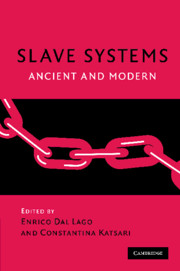Book contents
- Frontmatter
- Contents
- List of figures
- List of tables
- List of contributors
- Acknowledgments
- Part I SLAVERY, SLAVE SYSTEMS, WORLD HISTORY, AND COMPARATIVE HISTORY
- Chapter 1 The study of ancient and modern slave systems: setting an agenda for comparison
- Chapter 2 Slavery, gender, and work in the pre-modern world and early Greece: a cross-cultural analysis
- Chapter 3 Slaving as historical process: examples from the ancient Mediterranean and the modern Atlantic
- Part II ECONOMICS AND TECHNOLOGY OF ANCIENT AND MODERN SLAVE SYSTEMS
- Part III IDEOLOGIES AND PRACTICES OF MANAGEMENT IN ANCIENT AND MODERN SLAVERY
- Part IV EXITING SLAVE SYSTEMS
- Part V SLAVERY AND UNFREE LABOUR, ANCIENT AND MODERN
- Bibliography
- Index
Chapter 1 - The study of ancient and modern slave systems: setting an agenda for comparison
from Part I - SLAVERY, SLAVE SYSTEMS, WORLD HISTORY, AND COMPARATIVE HISTORY
Published online by Cambridge University Press: 22 September 2009
- Frontmatter
- Contents
- List of figures
- List of tables
- List of contributors
- Acknowledgments
- Part I SLAVERY, SLAVE SYSTEMS, WORLD HISTORY, AND COMPARATIVE HISTORY
- Chapter 1 The study of ancient and modern slave systems: setting an agenda for comparison
- Chapter 2 Slavery, gender, and work in the pre-modern world and early Greece: a cross-cultural analysis
- Chapter 3 Slaving as historical process: examples from the ancient Mediterranean and the modern Atlantic
- Part II ECONOMICS AND TECHNOLOGY OF ANCIENT AND MODERN SLAVE SYSTEMS
- Part III IDEOLOGIES AND PRACTICES OF MANAGEMENT IN ANCIENT AND MODERN SLAVERY
- Part IV EXITING SLAVE SYSTEMS
- Part V SLAVERY AND UNFREE LABOUR, ANCIENT AND MODERN
- Bibliography
- Index
Summary
Historical studies of slavery are, by definition, both global and comparative. Slavery, in fact, is an institution whose practice has covered most of the documented history of the world and has spread across many different countries and regions around the globe. Thus, very few societies have remained historically untouched by it, while, at different times and in different degrees, most have seen a more or less strong presence of slaves employed for a variety of different purposes within them. Throughout history and in many societies, masters have utilized their slaves for tasks as diverse as working on landed estates or even on industrial complexes, or, more commonly, serving in households and other domestic settings, and, more rarely, for specific military or religious purposes.
The chapters gathered in this collection represent the variety of experiences associated with slavery, while they focus particularly on the scholarly study of its influence on the economy and society of those cultures that made extensive use of it. Though the dimensions of the scholarly study of slavery, much as slavery itself, are truly global in their breadth – and the authors of each chapter are aware of this – the declared scope of the present book is to focus on the comparative analysis of two specific regions of the world where slavery flourished at different times: the ancient Mediterranean and the modern Atlantic.
- Type
- Chapter
- Information
- Slave SystemsAncient and Modern, pp. 3 - 31Publisher: Cambridge University PressPrint publication year: 2008
- 13
- Cited by



